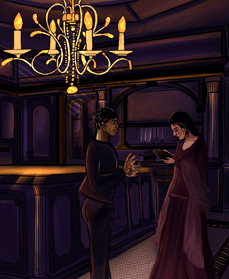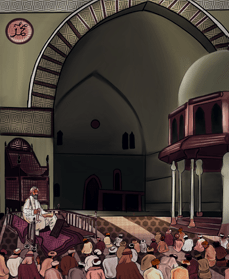
IN WOMEN WE TRUST
- Author: N.H.Sakhia
- Publisher: Acrobat Books
- Genre: Literary Fiction - 382 Pages
- ISBN #: 978-1-7354535-0-7 (Hardcover)

Kirkus Reviews
“A captivating drama in pursuit of dramatic truth.”
A teenager’s indiscretion becomes a family tragedy and threatens to become a national scandal in this Pakistan-set drama.
Gul is the 15-year-old son of poor people who work for Sardar Timur, a wealthy and powerful man in Hayatabad, Pakistan. He’s suddenly pulled into a brief sexual encounter with Timur’s daughter, Farah, on whom he had a longtime crush, and the two are discovered in an unlucky moment that has extraordinary reverberations. Furious at what he feels is his mortification, Timur calls for a Panchayat, an “informal justice system” that empowers a council of locals to mete out determinations of guilt and innocence. Author Sakhia astutely captures the nature of these easily corruptible proceedings, which are officially illegal but largely ignored by the police. For Gul and his family, the stakes couldn’t be higher; he could be castrated or killed, and his relations could also suffer gruesome fates. Meanwhile, a French journalist, Arlette Baudis, who has accused the prime minister of Pakistan of sexual harassment, attempts to make the Panchayat fiasco into an issue of international interest—not only to highlight the nation’s corruption, but also to challenge its sexist view of women. Over the course of this novel, the author presents a tale that is sinewy and rich, deftly depicting a traditional system of justice as a thinly disguised one of oppression. Sakhia’s sparse, straightforward prose is quietly moving, as when Baudis, in a fit of exasperated anger about the prime minister’s popular election, rages, “How stupid are you people? Where the damn hell is the moral compass?” Sakhia also manages, with great authorial restraint, to refrain from sacrificing the artistic elements of the story to a sententious lesson.
A captivating drama in pursuit of dramatic truth.
https://www.kirkusreviews.com/book-reviews/nh-sakhia/in-women-we-trust/
Reviewed Posted Online: 12/31/2020
Kirkus Reviews Verdict: Get It.

PW Review
“This intense novel … reveals urgent truths and will keep readers turning the pages.”
Attorney Sakhia’s tense English debut novel draws attention to the societal inequities in a small Pakistani town when a servant’s son is found in a compromising position with a landowner’s daughter. In Hayatabad, Pakistan, landowner Sardar Timur Barlas exerts his power as he plans to inflict punishment on Gul, son of housekeeper Zara Bibi, when Gul is discovered in a kitchen pantry in an improper embrace with Sardar’s daughter, Farah. Mullah Aziz, imam of the largest town mosque, is appointed to select members for the Panchayat, an unofficial tribunal responsible for deciding Gul’s guilt or innocence. Zara Bibi’s only hope to see Gul avoid the punishment of castration is to sacrifice her daughter, Badri, whom Sardar wants to be “given” to his men for three nights. Zara Bibi faces a decision that no mother should be forced to make–and if she doesn’t choose which child will suffer, Sardar will decide for her. As the Panchayat convenes, Mullah Aziz’s acquaintance, Turab, a journalist, documents the trial and questions the truth behind the accusations against Gul.
Sakhia deftly explores the injustices faced by those in subservient positions in Pakistan, vividly exposing brutality and corruption. The novel also highlights the disparate treatment of women as Sardar’s and Mullah Aziz’s wives must be deferential to their husbands’ decisions, and Badri suffers a vicious assault.
Sakhia focuses on disparate characters, revealing how Badri dreams of her grandmother Mimi Jan while she is in pain, and Mullah Aziz’s arrogance in controlling those who come to his mosque. These narratives initially appear unrelated, slowing the flow of the novel’s opening, but Sakhia adeptly connects them, rewarding patient readers. This in-depth study of life in a small town in Pakistan, the first installment in a series, richly outlines class and gender inequities while embracing believable, well-developed characters and a cliffhanger conclusion.
Takeaway: This intense novel of power in a Pakistani village reveals urgent truths and will keep readers turning the pages.
Great for fans of: Sejal Badani’s The Storyteller’s Secret, Madhuri Vijay’s The Far Field.

NPR Book Reviews
Coming soon…

The NY Times | Book Review
Coming soon…please check back.

Kirkus Reviews
“A captivating drama in pursuit of dramatic truth.”
A teenager’s indiscretion becomes a family tragedy and threatens to become a national scandal in this Pakistan-set drama.
Gul is the 15-year-old son of poor people who work for Sardar Timur, a wealthy and powerful man in Hayatabad, Pakistan. He’s suddenly pulled into a brief sexual encounter with Timur’s daughter, Farah, on whom he had a longtime crush, and the two are discovered in an unlucky moment that has extraordinary reverberations. Furious at what he feels is his mortification, Timur calls for a Panchayat, an “informal justice system” that empowers a council of locals to mete out determinations of guilt and innocence. Author Sakhia astutely captures the nature of these easily corruptible proceedings, which are officially illegal but largely ignored by the police. For Gul and his family, the stakes couldn’t be higher; he could be castrated or killed, and his relations could also suffer gruesome fates. Meanwhile, a French journalist, Arlette Baudis, who has accused the prime minister of Pakistan of sexual harassment, attempts to make the Panchayat fiasco into an issue of international interest—not only to highlight the nation’s corruption, but also to challenge its sexist view of women. Over the course of this novel, the author presents a tale that is sinewy and rich, deftly depicting a traditional system of justice as a thinly disguised one of oppression. Sakhia’s sparse, straightforward prose is quietly moving, as when Baudis, in a fit of exasperated anger about the prime minister’s popular election, rages, “How stupid are you people? Where the damn hell is the moral compass?” Sakhia also manages, with great authorial restraint, to refrain from sacrificing the artistic elements of the story to a sententious lesson.
A captivating drama in pursuit of dramatic truth.
https://www.kirkusreviews.com/book-reviews/nh-sakhia/in-women-we-trust/
Reviewed Posted Online: 12/31/2020
Kirkus Reviews Verdict: Get It.

PW Review
“This intense novel … reveals urgent truths and will keep readers turning the pages.”
Attorney Sakhia’s tense English debut novel draws attention to the societal inequities in a small Pakistani town when a servant’s son is found in a compromising position with a landowner’s daughter. In Hayatabad, Pakistan, landowner Sardar Timur Barlas exerts his power as he plans to inflict punishment on Gul, son of housekeeper Zara Bibi, when Gul is discovered in a kitchen pantry in an improper embrace with Sardar’s daughter, Farah. Mullah Aziz, imam of the largest town mosque, is appointed to select members for the Panchayat, an unofficial tribunal responsible for deciding Gul’s guilt or innocence. Zara Bibi’s only hope to see Gul avoid the punishment of castration is to sacrifice her daughter, Badri, whom Sardar wants to be “given” to his men for three nights. Zara Bibi faces a decision that no mother should be forced to make–and if she doesn’t choose which child will suffer, Sardar will decide for her. As the Panchayat convenes, Mullah Aziz’s acquaintance, Turab, a journalist, documents the trial and questions the truth behind the accusations against Gul.
Sakhia deftly explores the injustices faced by those in subservient positions in Pakistan, vividly exposing brutality and corruption. The novel also highlights the disparate treatment of women as Sardar’s and Mullah Aziz’s wives must be deferential to their husbands’ decisions, and Badri suffers a vicious assault.
Sakhia focuses on disparate characters, revealing how Badri dreams of her grandmother Mimi Jan while she is in pain, and Mullah Aziz’s arrogance in controlling those who come to his mosque. These narratives initially appear unrelated, slowing the flow of the novel’s opening, but Sakhia adeptly connects them, rewarding patient readers. This in-depth study of life in a small town in Pakistan, the first installment in a series, richly outlines class and gender inequities while embracing believable, well-developed characters and a cliffhanger conclusion.
Takeaway: This intense novel of power in a Pakistani village reveals urgent truths and will keep readers turning the pages.
Great for fans of: Sejal Badani’s The Storyteller’s Secret, Madhuri Vijay’s The Far Field.

NPR Book Reviews
Coming soon…

The NY Times | Book Review
Coming soon…please check back.
The Excerpts
Copyright © 2021 N.H. Sakhia All Rights Reserved





















Nice book